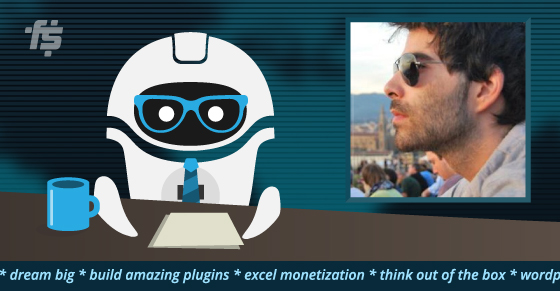|
|
David Aguilera is the Chief Product & Quality Officer at rapidly growing Nelio. We met at the last WordCamp in Paris and, after chatting for a while, I figured it would be interesting to get his take as a WordPress product & services guy and publish it for the Freemius blog readers.
David, thanks for agreeing to do this interview!
Let’s start by getting to know you a bit – what is your educational and professional background?
Thanks for having me. I’m really happy to do this!
I come from Barcelona, Spain – or, well, at least it was Spain when this interview took place because right now there’s this pro-independence movement in Catalonia and… nobody knows how it’ll all end! 🙁 But no politics, sorry! Let’s just say I’m from Barcelona, Southern Europe – a gorgeous city visited by thousands of tourists every year. Here you’ll find great architecture, amazing food, and warm people.

I studied computer science at Universitat Politècnica de Catalunya. During my studies, I worked as a programmer and analyst in a multidisciplinary research group at the university, focused on weather analysis. Obviously, I was in the IT team, but it was great to work side by side with mathematicians and civil engineers. Then, I enrolled in a Master’s Degree and a Ph.D. in conceptual modeling, which I finished in 2014.
During my last months there, a few colleagues from the university and I decided we’d create our own company. After our previous years working as researchers, we wanted the challenge of running our own business and continue to set our own goals. It’s quite funny because I remember we didn’t know what we’d work on, we just had this vague idea of becoming our own bosses. After creating the company and having a few discussions we decided we’d focus on WordPress development and that’s how Nelio was born!
As you mentioned, you guys are based in lovely Barcelona. How vibrant is the WordPress community over there? Do you guys have any local WordPress meetups or a WordCamp?
Thrilling! We have a wonderful and very active community! Just to give you a few numbers, we hold monthly meetups and we already held several WordCamps. Actually, the Nelio team had joined the organizing team, and WordCamp Barcelona 2018 is going to take place in 24 days! We’re very excited about it because we have tons of fresh ideas that we know attendees and sponsors will love.
When was your first encounter with WordPress and what’s the impression it had left on you?
My first encounter with WordPress was quite similar to everybody else’s: I wanted my own blog and WordPress seemed like the right choice. To be honest, though, I didn’t pay much attention to the platform at that time – it simply did what it was supposed to. Period. So I guess it didn’t impress me much, didn’t it? 🙂 But I think that’s the kind of impression any tool should leave on you! Keep in mind that WordPress, as a blogging platform, is not the goal, but just a mean. Users simply want to publish their articles on the web. If they don’t notice the tool and they get their job done, it means the developers have done theirs right.
A few years later, after my partners and I co-founded Nelio Software, WordPress came back into my life. I like to think of that time as my first real encounter with WordPress because I was no longer a “regular user” whose only goal was to “publish”, but someone eager to become a successful WordPress developer and run a business on top of it!
The first months were pretty tough — we didn’t have any products yet, and so we had to figure out a way to get some revenue. We started by offering a WordPress migration service, which proved to be a huge success. My partner, Antonio, was already an expert in data management, and so analyzing other CMSs databases and finding automated solutions to migrate data from those databases to WordPress was something we could excel at. The projects we worked on gave us a good perspective of the WordPress internals, and so we quickly learned how it works. Then, we studied the different APIs and started to create our first WordPress plugin: Nelio A/B Testing.
What were the main reasons that made you and your partners decide to establish a company that’s focused on the WordPress business sphere?
When we first created Nelio, we had no idea we’d end up working with WordPress. We had a few ideas on what we could do and “WordPress” was only one of them. In the end, we decided to go with WordPress for three main reasons:
- Its community and its open source nature. We’re a small team and, therefore, it’s very difficult to create something big when you’re on your own. We love the philosophy behind open source projects, where everyone helps and learns from each other. Besides, the Spanish community was very welcoming, so we felt at home from the very beginning.
- It matched our skillset and expectations. We already had some expertise in web development and databases, so learning the specifics of WordPress to develop on top of it seemed feasible. As I said, we started with a migration service, which turned out to work pretty well. There were some competitors with fully-automated services, but ours was completely tailored to the user’s needs, which means we were able to work on bigger projects and learn a lot throughout the process.
- It’s a big (and expanding) market. Just look at the statistics: WordPress runs 30 something percent of the web today! We basically looked at the trends and realized WordPress is one of the best web platforms to develop on.
We decided to go with WordPress for three main reasons: Its community and open source nature, our skill set, and the big market size.
How many of Nelio’s resources do you spend on product versus services?
That’s a pretty good question! First of all, we should agree on what “products” and “services” are. Assuming that plugins are products and custom projects (such as a migration to WordPress) are services, then we’re currently devoting all our resources to products.
Nowadays, we’re offering two plugins from which we get all our revenues: Nelio A/B Testing and Nelio Content, and that’s where all our resources go. Well, that’s not 100% accurate: some of our resources go to other tasks, such as writing posts for our blog, marketing campaigns, finances, and so on, but our development/work efforts are completely focused on those two products. Regarding our migration service, a few months ago we decided it was time to get rid of it — if we wanted to grow, we had to focus on our products and stop investing more time in custom projects.
Now, there’s a catch: we sell our WordPress plugins under a SaaS model. Both plugins rely on a cloud infrastructure we’ve created and our users pay a monthly fee to have access to said cloud. Therefore, we think of our plugins as a hybrid model between products and services.
Grab a free copy of our Cheat Sheet for
Selling Plugins and Themes
A growth roadmap with concise, actionable tips for every milestone of WordPress product development.

I’m curious about one of your native WordPress products – your A/B testing solution. Do you think that the common WordPress site owner is aware of the need for testing how elements on their website benefit their business? Is this relevant for WordPress plugin and theme developers as well?
This is a tough question… Let’s start with the basics: what’s a “common site owner”? If we’re talking about someone who runs a simple blog or is getting started, then the answer is no, such a user is not aware of the importance of testing their site. And why should they? During the very first steps towards a new website, I think they should focus on generating content and getting things as right as possible. Moreover, they’re probably not getting any income from their websites (directly or indirectly), so it wouldn’t make sense to invest in a testing tool at that point. If we’re talking about users who already have a “successful” blog (and you tell me what “successful” is) and maybe get some direct or indirect revenues from it, then a split testing plugin like ours is a great tool for improving your conversion rates.

I’m always surprised to see how heterogeneous our customer base is: we have single bloggers, people selling products and services, marketing agencies… They’re completely different from each other and, yet, they all use our tool. So, yes, I’d conclude they all agree on the importance of testing your site.
From a more general business perspective, out of all the efforts you have been investing in marketing & promoting your WordPress products – what has provided you with the biggest ROI (Return On Investment)?
Again, a pretty tough question. In the past, we invested some money in Google Adwords, but that didn’t work very well. If we were too specific, no one found us because no one used those specific keywords. If we used more generic keywords, prices were higher and the competition was fierce, and so we were like a drop in the ocean. We also tried paid reviews. I have mixed feelings about them – they definitely help us get some attention and brought a few users, but only a few of them converted.
So, today we follow a completely different approach: grow organically. We work very hard on our blog, writing as often as possible and focusing on the keywords that we believe will bring more visitors (and eventually customers). And we’ve experienced a steady growth in all our website metrics, so I think we’ve done a good job. However, we think that most of our users find us on WordPress.org, so we try to keep our plugins updated, be responsive and helpful in our support threads, … that sort of stuff.
Something that works pretty well is offering your products for free and then try to convert your users into customers from the tool itself.
Another thing that works pretty well is offering your products for free and then try to convert your users into customers from the tool itself. This is the approach we applied in Nelio Content and it’s working quite well. Of course, there’s a bunch of users who don’t need all our paid features — they’re more than satisfied with the free version, and we’re happy we can help them for free. But when they need more power or they want to upgrade, they already know we exist, how we work, and that we’ll always be there to help them. I think this sort of relationship with your users is the best guarantee of success.
Correct me if I’m wrong, but I understand that the financial situation in Spain hasn’t been amazing in the past few years. Has that affected your business at all? Has Nelio taken any steps to assure its income does not solely depend on local Spanish/Catalan businesses?
You’re absolutely right – the financial situation in Spain is not at its best. But it hasn’t affected us because from the very beginning Nelio has focused on the global market (we only have a few local customers; over 90% are from abroad). I think that one possible explanation is the fact that marketing tools like ours are not mainstream in Spain (and Spanish-speaking countries), yet. When they do become mainstream, though, I hope we’ll be one of the big players… and we’ll be speaking Spanish!
Where do you see Nelio Software in 5 years from today, and what are the measures you are taking to make sure success does not fade?
I suppose I should reply with some “strategic” view of the company, how it’ll fit the market and so on… something like “I’d like to see Nelio as a referent in marketing and publishing tools for WordPress”. But I’m a computer scientist and, as such, I like to think in different terms: I want a bigger customer base, I want to have more products, and I want to have more employees working at our company. If we can achieve these three goals, all by ourselves, I’d call it a huge win.
What’s one good tip you can provide for developers who are looking to create a sustainable business around WordPress products or services?
“Don’t let the perfect be the enemy of the good”. If you think you have a good idea, one that can become a business opportunity, create an MVP and release it ASAP. Test it with real users. Make sure it has the potential you believe it has.
I’ve seen a lot of examples of companies failing because their founders spent too much time creating “the perfect product” – the perfect product takes so much time that, by the time you release it, either you realize it’s useless (which means you lost a lot of time and money), or someone, with an inferior product, is already competing against you, with real customers. So work fast and don’t be afraid to fail.
David, thanks again for providing interesting answers to my questions. I have personally learned a LOT! In case someone wants to contact you online for business related inquiries or just to chat, what’s the best way to do that?
Thank you for giving me the chance to share my experience! If any of you want to get in touch with us, just go to our website, follow us on Twitter – @NelioSoft, or drop us an email at [email protected].







